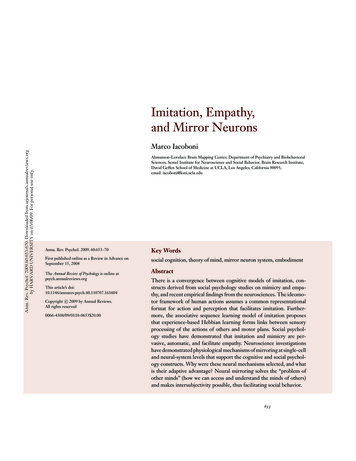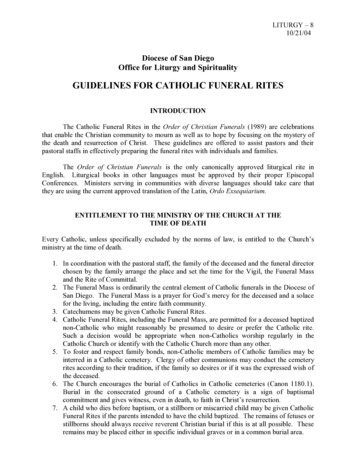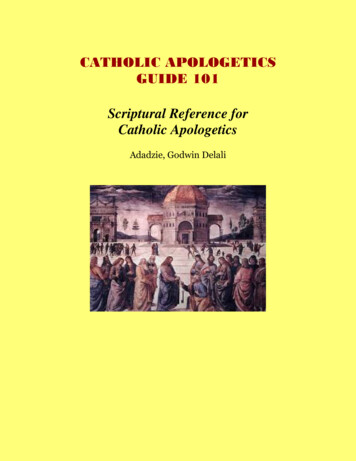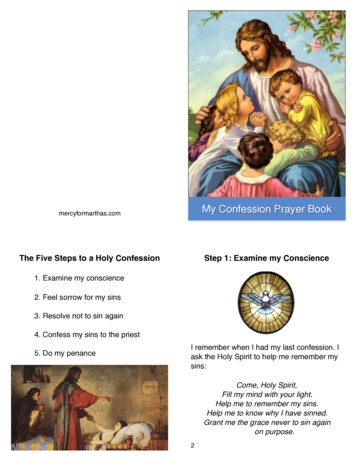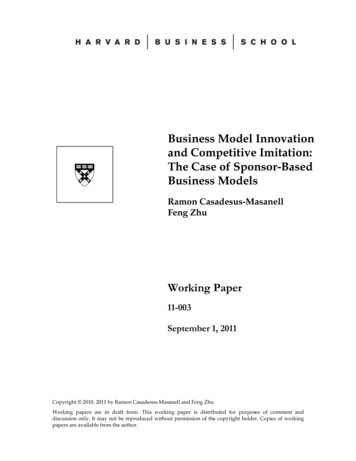
Transcription
THE IMITATIONOF CHRISTBYTHOMAS À KEMPISTRANSLATED FROMTHE LATIN INTOMODERN ENGLISHDigitized by Harry Plantinga, planting@cs.pitt.edu, 1994.This etext is in the public domain.
2FOREWORDIN PREPARING this edition of The Imitation of Christ, the aim was to achieve asimple, readable text which would ring true to those who are already lovers of thisincomparable book and would attract others to it. For this reason we have attempted torender the text into English as it is spoken today rather than the cloudy, archaicterminology that encumbers so many translations of Christian classics. The result, wefeel, has achieved a directness and conciseness which will meet the approval of modernreaders. In the second place, we have made use of the familiar paragraph form, doingaway with the simple statement or verse form of the original and of many translations.This was done in the interest of easier reading, and in order to bring out more clearlythe connection between the single statements.No claim of literary excellence over the many English versions now extant is hereadvanced, nor any attempt to solve in further confusion the problem of the book'sauthorship.Theories most popular at the moment ascribe the Imitation to two or three men,members of the Brethren of the Common Life, an association of priests organized in theNetherlands in the latter half of the fourteenth century. That Thomas Hemerken ofKempen, or Thomas À Kempis as he is now known, later translated a composite of theirwritings, essentially a spiritual diary, from the original Netherlandish into Latin isgenerally admitted by scholars. This Thomas, born about the year 1380, was educatedby the Brethren of the Common Life, was moved to join their community, and wasordained priest. His career thereafter was devoted to practicing the counsels of spiritualperfection and to copying books for the schools. From both pursuits evolved TheImitation of Christ. As editor and translator he was not without faults, but thanks to himthe Imitation became and has remained, after the Bible, the most widely read book in theworld. It is his edition that is here rendered into English, without deletion of chapters orparts of them because doubts exist as to their authorship, or because of variants in style,or for any of the other more or less valid reasons.There is but one major change. The treatise on Holy Communion, which ÀKempis places as Book Three, is here titled Book Four. The move makes the order of thewhole more logical and agrees with the thought of most editors.THE TRANSLATORSAloysius CroftHarold Bolton
3CONTENTSForewordBOOK ONETHOUGHTS HELPFUL IN THE LIFE OF THE ting Christ and Despising All Vanities on EarthHaving A Humble Opinion of SelfThe Doctrine of TruthPrudence in ActionReading the Holy ScriptureUnbridled AffectionsAvoiding False Hope and PrideShunning Over-FamiliarityObedience and SubjectionAvoiding Idle TalkAcquiring Peace and Zeal for PerfectionThe Value of AdversityResisting TemptationAvoiding Rash JudgmentWorks Done in CharityBearing With the Faults of OthersMonastic LifeThe Example Set Us by the Holy FathersThe Practices of a Good ReligiousThe Love of Solitude and SilenceSorrow of HeartThoughts on the Misery of ManThoughts on DeathJudgment and the Punishment of SinZeal in Amending Our LivesBOOK TWOTHE INTERIOR LIFE123456789MeditationHumilityGoodness and Peace in ManPurity of Mind and Unity of PurposeOurselvesThe Joy of a Good ConscienceLoving Jesus Above All ThingsThe Intimate Friendship of JesusWanting No Share in Comfort
410 Appreciating God's Grace11 Few Love the Cross of Jesus12 The Royal Road of the Holy CrossBOOK THREEINTERNAL 252627282930313233343536373839The Inward Conversation of Christ with the Faithful SoulTruth Speaks Inwardly without the Sound of WordsListen Humbly to the Words of God. Many Do Not Heed ThemWe Must Walk Before God in Humility and TruthThe Wonderful Effect of Divine LoveThe Proving of a True LoverGrace Must Be Hidden Under the Mantle of HumilitySelf-Abasement in the Sight of GodAll Things Should be Referred to God as their Last EndTo Despise the World and Serve God is SweetThe Longings of Our Hearts Must Be Examined and ModeratedAcquiring Patience in the Fight against ConcupiscenceThe Obedience of One Humbly Subject to the Example of Jesus ChristConsider the Hidden Judgments of God Lest You Become Proud of Your OwnGood DeedsHow One Should Feel and Speak on Every Desirable ThingTrue Comfort is to be Sought in God AloneAll Our Care is to be Placed in GodTemporal Sufferings Should be Borne Patiently, After the Example of ChristTrue Patience in SufferingConfessing Our Weakness in the Miseries of LifeAbove All Goods and All Gifts We Must Rest in GodRemember the Innumerable Gifts of GodFour Things Which Bring Great PeaceAvoiding Curious Inquiry About the Lives of OthersThe Basis of Firm Peace of Heart and True ProgressThe Excellence of a Free Mind, Gained Through Prayer Rather Than by StudySelf-Love is the Greatest Hindrance to the Highest GoodStrength Against SlanderHow We Must Call Upon and Bless the Lord When Trouble PressesThe Quest of Divine Help and Confidence in Regaining GraceTo Find the Creator, Forsake All CreaturesSelf-Denial and the Renunciation of Evil AppetitesRestlessness of Soul -- Directing Our Final Intention Toward GodGod is Sweet Above All Things and in All Things to Those Who Love HimThere is No Security from Temptation in This LifeThe Vain Judgments of MenPure and Entire Resignation of Self to Obtain Freedom of HeartThe Right Ordering of External Affairs; Recourse to God in DangersA Man Should Not be Unduly Solicitous about his Affairs
54041424344454647484950515253545556575859Man Has No Good in Himself and Can Glory in NothingContempt for All Earthly HonorPeace is not to be Placed in MenBeware Vain and Worldly KnowledgeDo Not be Concerned About Outward ThingsAll Men Are Not To Be Believed, For It is Easy To Err in SpeechTrust in God Against SlanderEvery Trial Must Be Borne for the Sake of Eternal LifeThe Day of Eternity and the Distresses of this LifeThe Desire of Eternal Life; The Great Rewards Promised to Those Who StruggleHow a Desolate Person Ought to Commit Himself into the Hands of GodWhen We Cannot Attain to the Highest, We Must Practice the Humble WorksA Man Ought Not to Consider Himself Worthy of Consolation, But RatherDeserving of ChastisementGod's Grace Is Not Given to the Earthly MindedThe Different Motions of Nature and GraceThe Corruption of Nature and the Efficacy of Divine GraceWe Ought to Deny Ourselves and Imitate Christ Through Bearing the CrossA Man Should Not Be Too Downcast When He Falls Into DefectsHigh Matters and the Hidden Judgments of God Are Not To Be ScrutinizedAll Hope and Trust Are To Be Fixed in God AloneBOOK FOURAN INVITATION TO HOLY COMMUNION123456789101112131415161718The Great Reverence With Which We Should Receive ChristGod's Great Goodness and Love is Shown to Man in This SacramentIt Is Profitable To Receive Communion OftenMany Blessings Are Given Those Who Receive Communion WorthilyThe Dignity of the Sacrament and of the PriesthoodAn Inquiry on the Proper Thing to do Before CommunionThe Examination of Conscience and the Resolution to AmendThe Offering of Christ on the Cross; Our OfferingWe Should Offer Ourselves and All That We Have to God, Praying for AllDo Not Lightly Forego Holy CommunionThe Body of Christ and Sacred Scripture Are Most Necessary to a Faithful SoulThe Communicant Should Prepare Himself for Christ with Great CareWith All Her Heart the Devout Soul Should Desire Union with Christ in theSacramentThe Ardent Longing of Devout Men for the Body of ChristThe Grace of Devotion is Acquired Through Humility and Self-DenialWe Should Show Our Needs to Christ and Ask His GraceThe Burning Love and Strong Desire to Receive ChristMan Should Not Scrutinize This Sacrament in Curiosity, But Humbly Imitate Christand Submit Reason to Holy Faith
6BOOK ONETHOUGHTS HELPFULIN THE LIFE OF THE SOULThe First ChapterIMITATING CHRIST AND DESPISING ALLVANITIES ON EARTHHE WHO follows Me, walks not in darkness," says the Lord.1 By these words ofChrist we are advised to imitate His life and habits, if we wish to be truly enlightenedand free from all blindness of heart. Let our chief effort, therefore, be to study the life ofJesus Christ.The teaching of Christ is more excellent than all the advice of the saints, and hewho has His spirit will find in it a hidden manna. Now, there are many who hear theGospel often but care little for it because they have not the spirit of Christ. Yet whoeverwishes to understand fully the words of Christ must try to pattern his whole life on thatof Christ.What good does it do to speak learnedly about the Trinity if, lacking humility,you displease the Trinity? Indeed it is not learning that makes a man holy and just, but avirtuous life makes him pleasing to God. I would rather feel contrition than know howto define it. For what would it profit us to know the whole Bible by heart and theprinciples of all the philosophers if we live without grace and the love of God? Vanity ofvanities and all is vanity, except to love God and serve Him alone.This is the greatest wisdom -- to seek the kingdom of heaven through contemptof the world. It is vanity, therefore, to seek and trust in riches that perish. It is vanityalso to court honor and to be puffed up with pride. It is vanity to follow the lusts of thebody and to desire things for which severe punishment later must come. It is vanity towish for long life and to care little about a well-spent life. It is vanity to be concernedwith the present only and not to make provision for things to come. It is vanity to lovewhat passes quickly and not to look ahead where eternal joy abides.Often recall the proverb: "The eye is not satisfied with seeing nor the ear filledwith hearing."2 Try, moreover, to turn your heart from the love of things visible andbring yourself to things invisible. For they who follow their own evil passions stain theirconsciences and lose the grace of God.The Second Chapter1 John 8:12.2 Eccles. 1:8.
7HAVING A HUMBLE OPINION OF SELFEVERY man naturally desires knowledge; but what good is knowledge withoutfear of God? Indeed a humble rustic who serves God is better than a proud intellectualwho neglects his soul to study the course of the stars. He who knows himself wellbecomes mean in his own eyes and is not happy when praised by men.If I knew all things in the world and had not charity, what would it profit mebefore God Who will judge me by my deeds?Shun too great a desire for knowledge, for in it there is much fretting anddelusion. Intellectuals like to appear learned and to be called wise. Yet there are manythings the knowledge of which does little or no good to the soul, and he who concernshimself about other things than those which lead to salvation is very unwise.Many words do not satisfy the soul; but a good life eases the mind and a cleanconscience inspires great trust in God.The more you know and the better you understand, the more severely will yoube judged, unless your life is also the more holy. Do not be proud, therefore, because ofyour learning or skill. Rather, fear because of the talent given you. If you think youknow many things and understand them well enough, realize at the same time thatthere is much you do not know. Hence, do not affect wisdom, but admit yourignorance. Why prefer yourself to anyone else when many are more learned, morecultured than you?If you wish to learn and appreciate something worth while, then love to beunknown and considered as nothing. Truly to know and despise self is the best andmost perfect counsel. To think of oneself as nothing, and always to think well andhighly of others is the best and most perfect wisdom. Wherefore, if you see another sinopenly or commit a serious crime, do not consider yourself better, for you do not knowhow long you can remain in good estate. All men are frail, but you must admit thatnone is more frail than yourself.The Third ChapterTHE DOCTRINE OF TRUTHHAPPY is he to whom truth manifests itself, not in signs and words that fade,but as it actually is. Our opinions, our senses often deceive us and we discern very little.What good is much discussion of involved and obscure matters when ourignorance of them will not be held against us on Judgment Day? Neglect of thingswhich are profitable and necessary and undue concern with those which are irrelevantand harmful, are great folly.We have eyes and do not see.What, therefore, have we to do with questions of philosophy? He to whom theEternal Word speaks is free from theorizing. For from this Word are all things and ofHim all things speak -- the Beginning Who also speaks to us. Without this Word no manunderstands or judges aright. He to whom it becomes everything, who traces all thingsto it and who sees all things in it, may ease his heart and remain at peace with God.
8O God, You Who are the truth, make me one with You in love everlasting. I amoften wearied by the many things I hear and read, but in You is all that I long for. Letthe learned be still, let all creatures be silent before You; You alone speak to me.The more recollected a man is, and the more simple of heart he becomes, theeasier he understands sublime things, for he receives the light of knowledge fromabove. The pure, simple, and steadfast spirit is not distracted by many labors, for hedoes them all for the honor of God. And since he enjoys interior peace he seeks noselfish end in anything. What, indeed, gives more trouble and affliction thanuncontrolled desires of the heart?A good and devout man arranges in his mind the things he has to do, notaccording to the whims of evil inclination but according to the dictates of right reason.Who is forced to struggle more than he who tries to master himself? This ought to beour purpose, then: to conquer self, to become stronger each day, to advance in virtue.Every perfection in this life has some imperfection mixed with it and no learningof ours is without some darkness. Humble knowledge of self is a surer path to God thanthe ardent pursuit of learning. Not that learning is to be considered evil, or knowledge,which is good in itself and so ordained by God; but a clean conscience and virtuous lifeought always to be preferred. Many often err and accomplish little or nothing becausethey try to become learned rather than to live well.If men used as much care in uprooting vices and implanting virtues as they do indiscussing problems, there would not be so much evil and scandal in the world, or suchlaxity in religious organizations. On the day of judgment, surely, we shall not be askedwhat we have read but what we have done; not how well we have spoken but how wellwe have lived.Tell me, where now are all the masters and teachers whom you knew so well inlife and who were famous for their learning? Others have already taken their places andI know not whether they ever think of their predecessors. During life they seemed to besomething; now they are seldom remembered. How quickly the glory of the worldpasses away! If only their lives had kept pace with their learning, then their study andreading would have been worth while.How many there are who perish because of vain worldly knowledge and toolittle care for serving God. They became vain in their own conceits because they chose tobe great rather than humble.He is truly great who has great charity. He is truly great who is little in his owneyes and makes nothing of the highest honor. He is truly wise who looks upon allearthly things as folly that he may gain Christ. He who does God's will and renounceshis own is truly very learned.The Fourth ChapterPRUDENCE IN ACTIONDO NOT yield to every impulse and suggestion but consider things carefully andpatiently in the light of God's will. For very often, sad to say, we are so weak that webelieve and speak evil of others rather than good. Perfect men, however, do not readilybelieve every talebearer, because they know that human frailty is prone to evil and islikely to appear in speech.
9Not to act rashly or to cling obstinately to one's opinion, not to believe everythingpeople say or to spread abroad the gossip one has heard, is great wisdom.Take counsel with a wise and conscientious man. Seek the advice of your bettersin preference to following your own inclinations.A good life makes a man wise according to God and gives him experience inmany things, for the more humble he is and the more subject to God, the wiser and themore at peace he will be in all things.The Fifth ChapterREADING THE HOLY SCRIPTURETRUTH, not eloquence, is to be sought in reading the Holy Scriptures; and everypart must be read in the spirit in which it was written. For in the Scriptures we ought toseek profit rather than polished diction.Likewise we ought to read simple and devout books as willingly as learned andprofound ones. We ought not to be swayed by the authority of the writer, whether he bea great literary light or an insignificant person, but by the love of simple truth. Weought not to ask who is speaking, but mark what is said. Men pass away, but the truthof the Lord remains forever. God speaks to us in many ways without regard forpersons.Our curiosity often impedes our reading of the Scriptures, when we wish tounderstand and mull over what we ought simply to read and pass by.If you would profit from it, therefore, read with humility, simplicity, and faith,and never seek a reputation for being learned. Seek willingly and listen attentively tothe words of the saints; do not be displeased with the sayings of the ancients, for theywere not made without purpose.The Sixth ChapterUNBRIDLED AFFECTIONSWHEN a man desires a thing too much, he at once becomes ill at ease. A proudand avaricious man never rests, whereas he who is poor and humble of heart lives in aworld of peace. An unmortified man is quickly tempted and overcome in small, triflingevils; his spirit is weak, in a measure carnal and inclined to sensual things; he canhardly abstain from earthly desires. Hence it makes him sad to forego them; he is quickto anger if reproved. Yet if he satisfies his desires, remorse of conscience overwhelmshim because he followed his passions and they did not lead to the peace he sought.True peace of heart, then, is found in resisting passions, not in satisfying them.There is no peace in the carnal man, in the man given to vain attractions, but there ispeace in the fervent and spiritual man.The Seventh Chapter
10AVOIDING FALSE HOPE AND PRIDEVAIN is the man who puts his trust in men, in created things.Do not be ashamed to serve others for the love of Jesus Christ and to seem poorin this world. Do not be self-sufficient but place your trust in God. Do what lies in yourpower and God will aid your good will. Put no trust in your own learning nor in thecunning of any man, but rather in the grace of God Who helps the humble and humblesthe proud.If you have wealth, do not glory in it, nor in friends because they are powerful,but in God Who gives all things and Who desires above all to give Himself. Do notboast of personal stature or of physical beauty, qualities which are marred anddestroyed by a little sickness. Do not take pride in your talent or ability, lest youdisplease God to Whom belongs all the natural gifts that you have.Do not think yourself better than others lest, perhaps, you be accounted worsebefore God Who knows what is in man. Do not take pride in your good deeds, for God'sjudgments differ from those of men and what pleases them often displeases Him. Ifthere is good in you, see more good in others, so that you may remain humble. It doesno harm to esteem yourself less than anyone else, but it is very harmful to thinkyourself better than even one. The humble live in continuous peace, while in the heartsof the proud are envy and frequent anger.The Eighth ChapterSHUNNING OVER-FAMILIARITYDO NOT open your heart to every man, but discuss your affairs with one who iswise and who fears God. Do not keep company with young people and strangers. Donot fawn upon the rich, and do not be fond of mingling with the great. Associate withthe humble and the simple, with the devout and virtuous, and with them speak ofedifying things. Be not intimate with any woman, but generally commend all goodwomen to God. Seek only the intimacy of God and of His angels, and avoid the notice ofmen.We ought to have charity for all men but familiarity with all is not expedient.Sometimes it happens that a person enjoys a good reputation among those who do notknow him, but at the same time is held in slight regard by those who do. Frequently wethink we are pleasing others by our presence and we begin rather to displease them bythe faults they find in us.The Ninth ChapterOBEDIENCE AND SUBJECTIONIT IS a very great thing to obey, to live under a superior and not to be one's ownmaster, for it is much safer to be subject than it is to command. Many live in obediencemore from necessity than from love. Such become discontented and dejected on the
11slightest pretext; they will never gain peace of mind unless they subject themselveswholeheartedly for the love of God.Go where you may, you will find no rest except in humble obedience to the ruleof authority. Dreams of happiness expected from change and different places havedeceived many.Everyone, it is true, wishes to do as he pleases and is attracted to those who agreewith him. But if God be among us, we must at times give up our opinions for theblessings of peace.Furthermore, who is so wise that he can have full knowledge of everything? Donot trust too much in your own opinions, but be willing to listen to those of others. If,though your own be good, you accept another's opinion for love of God, you will gainmuch more merit; for I have often heard that it is safer to listen to advice and take itthan to give it. It may happen, too, that while one's own opinion may be good, refusal toagree with others when reason and occasion demand it, is a sign of pride and obstinacy.The Tenth ChapterAVOIDING IDLE TALKSHUN the gossip of men as much as possible, for discussion of worldly affairs,even though sincere, is a great distraction inasmuch as we are quickly ensnared andcaptivated by vanity.Many a time I wish that I had held my peace and had not associated with men.Why, indeed, do we converse and gossip among ourselves when we so seldom partwithout a troubled conscience? We do so because we seek comfort from one another'sconversation and wish to ease the mind wearied by diverse thoughts. Hence, we talkand think quite fondly of things we like very much or of things we dislike intensely.But, sad to say, we often talk vainly and to no purpose; for this external pleasureeffectively bars inward and divine consolation.Therefore we must watch and pray lest time pass idly.When the right and opportune moment comes for speaking, say something thatwill edify.Bad habits and indifference to spiritual progress do much to remove the guardfrom the tongue. Devout conversation on spiritual matters, on the contrary, is a greataid to spiritual progress, especially when persons of the same mind and spirit associatetogether in God.The Eleventh ChapterACQUIRING PEACE AND ZEAL FOR PERFECTIONWE SHOULD enjoy much peace if we did not concern ourselves with whatothers say and do, for these are no concern of ours. How can a man who meddles inaffairs not his own, who seeks strange distractions, and who is little or seldom inwardlyrecollected, live long in peace?Blessed are the simple of heart for they shall enjoy peace in abundance.
12Why were some of the saints so perfect and so given to contemplation? Becausethey tried to mortify entirely in themselves all earthly desires, and thus they were ableto attach themselves to God with all their heart and freely to concentrate their innermostthoughts.We are too occupied with our own whims and fancies, too taken up with passingthings. Rarely do we completely conquer even one vice, and we are not inflamed withthe desire to improve ourselves day by day; hence, we remain cold and indifferent. Ifwe mortified our bodies perfectly and allowed no distractions to enter our minds, wecould appreciate divine things and experience something of heavenly contemplation.The greatest obstacle, indeed, the only obstacle, is that we are not free frompassions and lusts, that we do not try to follow the perfect way of the saints. Thus whenwe encounter some slight difficulty, we are too easily dejected and turn to humanconsolations. If we tried, however, to stand as brave men in battle, the help of the Lordfrom heaven would surely sustain us. For He Who gives us the opportunity of fightingfor victory, is ready to help those who carry on and trust in His grace.If we let our progress in religious life depend on the observance of its externalsalone, our devotion will quickly come to an end. Let us, then, lay the ax to the root thatwe may be freed from our passions and thus have peace of mind.If we were to uproot only one vice each year, we should soon become perfect.The contrary, however, is often the case -- we feel that we were better and purer in thefirst fervor of our conversion than we are after many years in the practice of our faith.Our fervor and progress ought to increase day by day; yet it is now considerednoteworthy if a man can retain even a part of his first fervor.If we did a little violence to ourselves at the start, we should afterwards be ableto do all things with ease and joy. It is hard to break old habits, but harder still to goagainst our will.If you do not overcome small, trifling things, how will you overcome the moredifficult? Resist temptations in the beginning, and unlearn the evil habit lest perhaps,little by little, it lead to a more evil one.If you but consider what peace a good life will bring to yourself and what joy itwill give to others, I think you will be more concerned about your spiritual progress.The Twelfth ChapterTHE VALUE OF ADVERSITYIT IS good for us to have trials and troubles at times, for they often remind usthat we are on probation and ought not to hope in any worldly thing. It is good for ussometimes to suffer contradiction, to be misjudged by men even though we do well andmean well. These things help us to be humble and shield us from vainglory. When to alloutward appearances men give us no credit, when they do not think well of us, then weare more inclined to seek God Who sees our hearts. Therefore, a man ought to roothimself so firmly in God that he will not need the consolations of men.When a man of good will is afflicted, tempted, and tormented by evil thoughts,he realizes clearly that his greatest need is God, without Whom he can do no good.Saddened by his miseries and sufferings, he laments and prays. He wearies of living
13longer and wishes for death that he might be dissolved and be with Christ. Then heunderstands fully that perfect security and complete peace cannot be found on earth.The Thirteenth ChapterRESISTING TEMPTATIONSO LONG as we live in this world we cannot escape suffering and temptation.Whence it is written in Job: "The life of man upon earth is a warfare."3 Everyone,therefore, must guard against temptation and must watch in prayer lest the devil, whonever sleeps but goes about seeking whom he may devour, find occasion to deceivehim. No one is so perfect or so holy but he is sometimes tempted; man cannot bealtogether free from temptation.Yet temptations, though troublesome and severe, are often useful to a man, for inthem he is humbled, purified, and instructed. The saints all passed through manytemptations and trials to profit by them, while those who could not resist becamereprobate and fell away. There is no state so holy, no place so secret that temptationsand trials will not come. Man is never safe from them as long as he lives, for they comefrom within us -- in sin we were born. When one temptation or trial passes, anothercomes; we shall always have something to suffer because we have lost the state oforiginal blessedness.Many people try to escape temptations, only to fall more deeply. We cannotconquer simply by fleeing, but by patience and true humility we become stronger thanall our enemies. The man who only shuns temptations outwardly and does not uprootthem will make little progress; indeed they will quickly return, more violent thanbefore.Little by little, in patience and long-suffering you will overcome them, by thehelp of God rather than by severity and your own rash ways. Often take counsel whentempted; and do not be harsh with others who are tempted, but console them as youyourself would wish to be consoled.The beginning of all temptation lies in a wavering mind and little trust in God,for as a rudderless ship is driven hither and yon by waves, so a careless and irresoluteman is tempted in many ways. Fire tempers iron and temptation steels the just. Oftenwe do not know what we can stand, but temptation shows us what we are.Above all, we must be especially alert against the beginnings of temptation, forthe enemy is more easily conquered if he is refused admittance to the mind and is metbeyond the threshold when he knocks.Someone has said very aptly: "Resist the beginnings; remedies come too late,when by long delay the evil has gained strength." First, a mere thought comes to mind,then strong imagination, followed by pleasure, evil delight, and consent. Thus, becausehe is not resisted in the beginning, Satan gains full entry. And the longer a man delaysin resisting, so much the weaker does he become each day, while the strength of theenemy grows against him.Some suffer great temptations in the beginning of their conversion, others towardthe end, while some are troubled almost constantly throughout their life. Others, again,3 Job 7:1.
14
Gospel often but care little for it because they have not the spirit of Christ. Yet whoever wishes to understand fully the words of Christ must try to pattern his whole life on that of Christ. What good does it do to speak learnedly about the Trinity if, lacking humility, you displease the Trinity?


